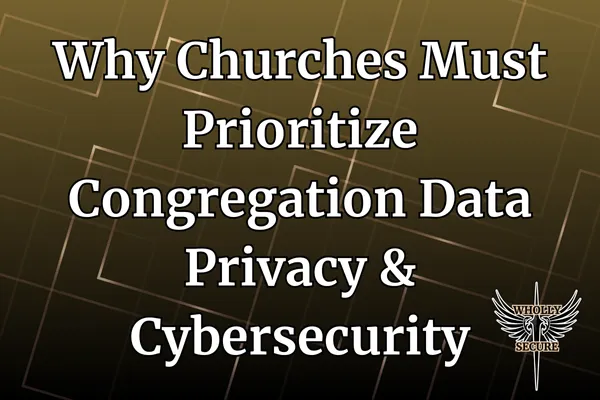
Why Churches Must Prioritize Congregation Data Privacy & Cybersecurity
Why Churches Must Prioritize Congregation Data Privacy & Cybersecurity
Churches, much like any community-focused entity, are struggling to navigate the complex world of data privacy and cybersecurity. The sanctity of the relationship between a church and its congregation is not just a matter of spiritual or communal trust, but extends into the realm of digital privacy and security
For centuries, churches have been sanctuaries offering not just spiritual guidance but also a sense of community and safety. In today's digital age, this sanctuary extends into the virtual world where personal data and privacy are just as important as the physical. Churches hold a wealth of sensitive information – from personal contact details to donation records. This data, if compromised, could not only breach trust, but also expose congregants to risks like identity theft and fraud. The digitalization of church operations, from online sermons to virtual tithing, while beneficial, brings with it a host of cybersecurity risks. The shift to digital platforms for communication, event organization, and financial transactions means handling a significant amount of personal data. Without robust cybersecurity measures, this data is vulnerable to breaches, hacking, and unauthorized access.
Why Data Privacy Matters in Faith-Based Communities
Ethical Responsibility: Protecting congregant data goes beyond mere compliance; it resonates deeply with the ethical teachings central to most religious doctrines. In many faiths, stewardship is a core tenet - being entrusted with the care of others. When congregants share their personal information, they are entrusting the church with a part of their lives. Safeguarding this data is a modern form of stewardship, reflecting respect for the privacy and dignity of each individual. This responsibility extends to ensuring that this information is not only secure but used in a manner that is transparent and accountable, aligning with the moral and ethical standards of the church.
Legal Compliance: Religious organizations, like any other entity that handles personal data, are subject to legal obligations under laws such as the General Data Protection Regulation (GDPR) in the EU and the California Consumer Privacy Act (CCPA) in the USA. These laws are designed to protect the privacy and integrity of individuals' personal data. Non-compliance not only attracts substantial fines but also legal scrutiny that can tarnish the reputation of the religious institution. Understanding and adhering to these regulations is not just a legal formality but a commitment to upholding the trust congregants place in their church.
Trust and Reputation: The relationship between a church and its congregation is built on a foundation of trust, often developed over generations. A breach of data privacy can severely damage this trust, leading to a loss of confidence among the congregational members. This erosion of trust can have far-reaching consequences, from decreased attendance to a reluctance in financial giving, and can ultimately hinder the church's mission and community service efforts. Maintaining rigorous data privacy practices is essential to preserve the integrity and reputation of the church in the eyes of its members and the broader community.
Potential Risks and Their Impact:
Financial Fraud: The financial implications of a data breach can be devastating. Stolen financial data, such as credit card information or bank details, can lead to unauthorized transactions, draining congregants' funds and potentially implicating the church in financial controversies.
Identity Theft: Personal details can be exploited to commit fraud or other illegal activities under a congregant's name, leading to legal and financial troubles for individuals and potentially implicating the church in identity theft cases.
Phishing Scams: Cybercriminals often use stolen contact information to launch phishing scams, deceiving congregants into revealing sensitive information or donating under false pretenses.
Proactive Steps Towards Cybersecurity:
Educate Your Community: Regular education sessions for staff and congregants about the latest cyber threats and protective measures can significantly reduce vulnerability. This education should include recognizing phishing attempts, safe browsing practices, and the importance of strong passwords.
Implement Robust Security Measures: Churches should employ state-of-the-art cybersecurity measures, including encrypted communication channels, secure payment gateways, and robust firewalls. Regularly updating these protocols to address new threats is critical.
Regular Audits: Routine cybersecurity audits are crucial in identifying potential vulnerabilities and ensuring that all protective measures are up to date and effective. These audits should assess all aspects of the church's digital infrastructure, from data storage and management systems to network security protocols. The findings should be used to refine and strengthen the church's cybersecurity strategy continuously.
At Wholly Secure, we understand the unique cybersecurity needs of churches. We offer tailored solutions to ensure that your congregation’s data is protected with the utmost care and sophistication. Our approach is not just about implementing technology; it's about nurturing a culture of security and privacy that aligns with your church’s values and mission. Like any community, the digital domain thrives on trust and safety. For churches, ensuring the privacy and security of congregation data is not just a technical necessity but a moral imperative. In partnering with experts like Wholly Secure, churches can fortify their defenses, ensuring that the sanctity of their congregational trust extends into the digital realm. Remember, in the landscape of faith and community, every step towards securing data is a step towards preserving trust and sanctity.
To get started on your church's journey to cyber stability, visit WhollySecure.com and request an initial assessment today!